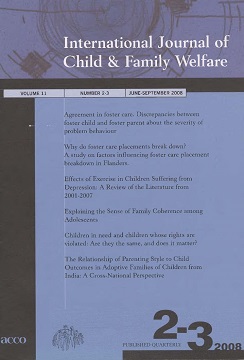The Relationship of Parenting Style to Child Outcomes in Adoptive Families of Children from India: A Cross-National Perspective
Keywords:
India, Norway, adoptions, parenting-styles, child-behavior, measurement-reliabilityAbstract
Parents exert a major influence on the way children express personality characteristics and behaviors, regardless of whether the children are biological or adopted by the parents. A large part of parental influence is through parenting style which is often characterized as having the two components: structure and nurturance. A sample of 415 adoptive families from both India and Norway that had adopted Indian children were surveyed using the Child Behavior Checklist (CBCL) and Parenting Scale (PS). Results suggested that the Indian adoptive parents were more homogenous in their parenting styles than were Norwegian adoptive parents, and Indian adoptive parents reported higher scores for “clinical” behavior of their children (per the CBCL) than did Norwegian adoptive parents. Significant correlations between children’s behaviors and difficult parenting styles were also detected for Indian families, but less so for Norwegian families. Children’s behaviors, along with demographic variables, were also used to develop an exploratory, predictive model of adoptive parenting styles. The nature of the results is also discussed regarding the use of American-developed measures in other nations and cultures.

